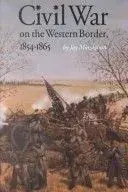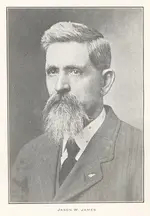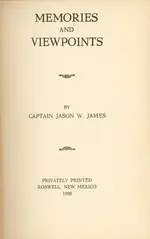Here is a thread of messages that were posted today on our Bloody Bill Anderson Mystery group regarding a rare book by ex-Guerrilla, Brown County Texas Ranger, Jesse W. James's first cousin Capt. Jason W. James.
***
Re: Captain Jason W. James C. S. A.
Great work, Lou! Thank you so much for locating this book written by
Brown County Texas Ranger Jason W. James. Brown County
historians/writers wrote that Jason W. James was Jesse W. James's
first cousin and that the two were nearly identical in appearance.
While saving the photo on this webpage to my private files, I
couldn't help but notice Jason's resemblance to Brownwood's Henry
Ford. I am going to post the contents of this webpage at the bottom
of this reply so we will have access to it as our research into
Bloody Bill Anderson and the KGC continues. I'm also going to add
the page's link to our group's Links section.
~Jay~
***
http://www.dsloan.com/Auctions/A19/item-james-jason-two-titles.html
AUCTION 19
"A Confederate Rarity of the First Magnitude" (Parrish)
70. JAMES, Jason W. Two titles: (1) Memorable Events in the Life of
Captain Jason W. James. [Roswell, New Mexico?, 1911]. 150 pp., one
plate (photograph of author). 8vo, original gilt-lettered grey
cloth. Light soiling to cloth, otherwise very fine. Inscribed and
signed by James: "To Mr. R. B. Slight, With the compliments and best
wishes of the author. Jason W. James, Altura Ranch Tex., April 28th
1914." Exceedingly rare. (2) Memories and Viewpoints. Roswell:
Privately printed, 1928. 183 [1 blank] pp. 12mo, original gilt-
lettered grey cloth. Small snag on lower spine, otherwise fine.
Uncommon.
First edition of both vols. The 1911 work is exceedingly rare.
The only sales records we trace for the 1911 volume are the Norris
copy in 1948 and a copy sold privately by Jenkins for $1,750, the
latter described by Michael Parrish as "a Confederate rarity of the
first magnitude." Parrish describes James' work as "a
straightforward, literate reminiscence, filled with details about his
service in the Missouri militia in the Trans-Mississippi under
Sterling Price early in the war, and his subsequent experience as a
Confederate partisan cavalry officer operating along the western side
of the Mississippi, mainly in Louisiana under Captain J. C. Lea.
Fighting invading Yankee detachments as well as outlaw guerrillas,
James' men had a special taste for attacking units of Black Federal
troops stationed at various points along the river." The 1928 title
forms a companion volume to the preceding work. Some of the same
events are covered, but different points are brought out and some
experiences are new or greatly expanded. First title

ornbusch
II:2863. Flake 4315a: "Hauled freight to Camp Floyd in 1858; recounts
the Mountain Meadows massacre." Howes J45: "Companion volume to item
below [Howes J46] covering boyhood, civil war and ranger activities,
ranching." Norris 3901. Second title: Adams, Herd 1148: "Scarce."
Graff 2190. Flake 4316. Howes J46: "Buffalo hunting; ranching on the
Rio Grande; with Johnston's Utah expedition in 1858; etc." Not in
Mattes (Platte River Road Narratives) or the Eberstadt modern
overlands list.
In 1858 at the age of fifteen the author (b. Missouri 1843-d.
Uvalde, Texas, 1933) travelled overland from Missouri to Salt Lake to
haul 6,000 pounds of freight to supply General Harney's troops
engaged in the "Mormon War." After reaching Provo and Salt Lake City,
James joined with Russell, Majors, and Waddell to Fort Leavenworth.
On this arduous trip James' feet were frozen when the party was
forced to lay up for three days between Fort Bridger and South Pass.
He recovered at Fort Laramie and describes trading with Sioux and
Cheyenne to obtain a pair of moccasins, the only type of footwear his
injured feet could tolerate. The following year he witnessed the
Pike's Peak Gold Rush when he travelled to Fort Bridger. In 1861
James enlisted with Kirtley's troops to drive the Kansas Jayhawkers
out of Missouri and rode with Quantrill, giving an officer's eye-
witness account of the Lawrence Massacre and Baxter Springs. During
the latter part of the War, James served in Mississippi and
Louisiana, and was one of the last officers to surrender (June 27,
1865).
During Reconstruction in Louisiana James helped organize the "Ku
Klux," White Camelias, and Bulldozers ("we had to work in such a way
that no evidence could be found against us"). He bluntly outlines the
intimidation and violence, including deadly shootouts he and his men
inflicted on white Republicans and their Black allies. He herded
sheep in Colorado Territory in 1874, and in 1883 drove a herd of
cattle from Delhi, Louisiana, to Orange, Texas. He joined Gillespie's
Texas Rangers the following year assisting in the apprehension of
murderers, horse and cattle thieves, and fence cutters. He later
worked on the railroad in East Texas and Louisiana. In 1892 he
relocated to Roswell, New Mexico, supervising the Roswell Land and
Water Company. In a chapter on "Ranching in Texas," James tells how
in 1904 he purchased from Ranger Capt. James. B. Gillett the Altura
Ranch in Brewster County (fourteen miles from Alpine, next to A. S.
Gage's ranch). He describes the transition from open-range to fenced
ranching and the attendant violence. His rousing and frequently
violent ventures conclude prosaically with chapters on his Masonic
activities and boating and hunting on the Texas Gulf Coast.
Among the expanded and new material in the 1928 volume are his
1858 buffalo hunt in Nebraska; apprehending counterfeiters in Paris,
Texas, around 1890; ranching on the Rio Grande in 1883-1884 at Myers
Canyon in the brush country thirty miles above the mouth of the Pecos
River; relocating to Murphyville (now Alpine) in 1894; diary of the
first boat trip to make the run from Galveston to Port Aransas and
return through the Intracoastal Canal (1913); involvement with the
New Mexico Military Institute; dispute of the Great American Desert
theory; "The Paramount Aim of the Klan"; "New Mexico's Future"; etc.
2 vols. ($1,500-3,000)
****
~Jay~
http://groups.yahoo.com/group/bloodybillandersonmystery




 THANKS, T.J. !
THANKS, T.J. ! 
 ornbusch
ornbusch

